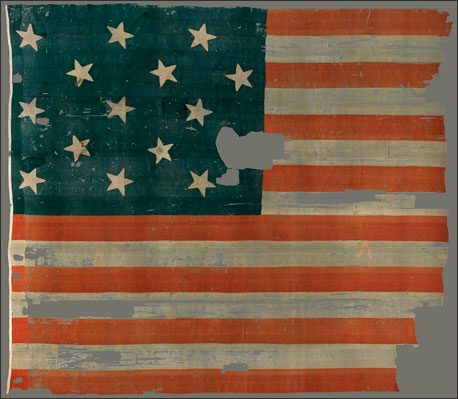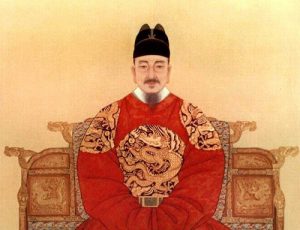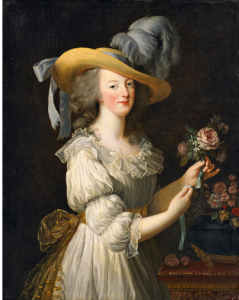Francis Scott Key was born on August 1, 1779 in Terra Rubra, Maryland. After graduating college, Key began to study law in hopes of becoming an attorney.1 Soon after, Keys got married and had eleven children and moved to Georgetown where he started his own practice.2 Key became very successful in his work as a lawyer, and for hobbies he sang for the church and wrote poems, a lot of which are still appreciated today. When the War of 1812 broke out, Key enlisted in the US army.3

Francis Scott Key was sent to a British ship to negotiate the release of certain prisoners. Upon Key’s arrival to the ship, he showed the Commodore of the ship letters from British troops that had been captured by American forces.4 The letters explained how well they were being treated and that they were not harmed in any way. After seeing this, the Commodore let their prisoner William Beanes free, but before the three American men could leave, the British troops were preparing to attack Fort McHenry, and therefore needed to keep them on the ship so that they would not be able to return back to warn the American troops.5
For over twenty-four hours the two sides, American and British, exchanged fire. The British recorded that “over eight hundred shells” were shot at the fort.6 After twenty-four hours of fighting both on land and sea, Francis Scott Key waited for the smoke to clear and saw that the American flag at Fort McHenry was still waving high. Key immediately began to write a poem on what he had witnessed that day. The poem quickly rose to fame and gained the attention of almost every single American.7
Very few people know that the poem went through different phases before becoming the American National Anthem. The original title of the poem was “The Defense of Fort McHenry.” Key later added the tune from an old drinking song called “To Anacreon in Heaven.”8 Later, Congress met to decide on a song for the nation; all songs were rejected, including “The Defense on Fort McHenry.” People that opposed the song claimed that the lyrics were too difficult to sing, it was not martial enough, and it was only about one event in all of American history.9 People who supported the song loved that the lyrics were difficult; that way only professional musicians and singers could sing it before certain important occasions.10
It was not until 1916 that the United States made the “The Star-Spangled Banner” the unofficial nation anthem. Woodrow Wilson was asked to have a “ceremonial song” for the United States, so he picked the most loved song by the people of the United States.11 But it was not until 1931 that Congress adopted the “The Star-Spangled Banner” as the official nation anthem of America. The poem was seen and adored by Americans for the patriotism it stood for and as a reminder of its past victories. This song is now sung before almost every major event in the United States to serve as a reminder of America’s victory against all odds.12
While the first stanza of the poem is widely known and sung today, few have been able to appreciate it in its entirety. Here, then, is the original poem:
O say can you see, by the dawn’s early light,
What so proudly we hail’d at the twilight’s last gleaming,
Whose broad stripes and bright stars through the perilous fight
O’er the ramparts we watch’d were so gallantly streaming?
And the rocket’s red glare, the bomb bursting in air,
Gave proof through the night that our flag was still there,
O say does that star-spangled banner yet wave
O’er the land of the free and the home of the brave?
On the shore dimly seen through the mists of the deep
Where the foe’s haughty host in dread silence reposes,
What is that which the breeze, o’er the towering steep,
As it fitfully blows, half conceals, half discloses?
Now it catches the gleam of the morning’s first beam,
In full glory reflected now shines in the stream,
‘Tis the star-spangled banner – O long may it wave
O’er the land of the free and the home of the brave!
And where is that band who so vauntingly swore,
That the havoc of war and the battle’s confusion
A home and a Country should leave us no more?
Their blood has wash’d out their foul footstep’s pollution.
No refuge could save the hireling and slave
From the terror of flight or the gloom of the grave,
And the star-spangled banner in triumph doth wave
O’er the land of the free and the home of the brave.
O thus be it ever when freemen shall stand
Between their lov’d home and the war’s desolation!
Blest with vict’ry and peace may the heav’n rescued land
Praise the power that hath made and preserv’d us a nation!
Then conquer we must, when our cause it is just,
And this be our motto – “In God is our trust,”
And the star-spangled banner in triumph shall wave
O’er the land of the free and the home of the brave.13
- War of 1812, 2002, s.v. “Key, Francis Scott.” ↵
- War of 1812, 2002, s.v. “Key, Francis Scott.” ↵
- War of 1812, 2002, s.v. “Key, Francis Scott.” ↵
- War of 1812, 2002, s.v. “Key, Francis Scott.” ↵
- UXL Encyclopedia of U.S. History, 2009, s.v. “The Star-Spangled Banner,” by Sonia Benson, Daniel E. Brannen, Jr., and Rebecca Valentine. ↵
- UXL Encyclopedia of U.S. History, 2009, s.v. “The Star-Spangled Banner,” by Sonia Benson, Daniel E. Brannen, Jr., and Rebecca Valentine. ↵
- UXL Encyclopedia of U.S. History, 2009, s.v. “The Star-Spangled Banner,” by Sonia Benson, Daniel E. Brannen, Jr., and Rebecca Valentine. ↵
- “Key, Francis Scott,” in Shaping of America, 1783-1815 Reference Library, edited by Lawrence W. Baker, Richard C. Hanes, Sharon M. Hanes, and Kelly Rudd, Vol. 2, Biographies Volume 1, 257. ↵
- “Key, Francis Scott,” in Shaping of America, 1783-1815 Reference Library, edited by Lawrence W. Baker, Richard C. Hanes, Sharon M. Hanes, and Kelly Rudd, Vol. 2, Biographies Volume 1, 258. ↵
- “Key, Francis Scott.” In Shaping of America, 1783-1815 Reference Library, edited by Lawrence W. Baker, Richard C. Hanes, Sharon M. Hanes, and Kelly Rudd, . Vol. 2, Biographies Volume 1,258. ↵
- “Key, Francis Scott.” In Shaping of America, 1783-1815 Reference Library, edited by Lawrence W. Baker, Richard C. Hanes, Sharon M. Hanes, and Kelly Rudd, Vol. 2, Biographies Volume 1,258. ↵
- UXL Encyclopedia of U.S. History, 2009 s.v. “The Star-Spangled Banner,” by Benson, Sonia, Daniel E. Brannen, Jr., and Rebecca Valentine. ↵
- Francis Scott Key, “The Star-Spangled Banner” (wording of the original handwritten manuscript, in the Museum Department of the Maryland Historical Society). ↵



101 comments
Christopher Sanchez
I was curious were The Star-Spangled Banner originated from, I knew it was a poem and had to go through different transformations. This article provides good insight about Francis Scott Key who was a proud American that was fighting for Independence. I for one couldn’t write a poem in the middle of battle but Keys had the feeling to write it and overtime became a song of patriotism.
Cristina Cabello
I grew up saying the Star Spangled Banner everyday in grade school. But never really thought of what it really meant. This article does a great job at doing that. A couple months ago my dad showed me this YouTube video about it. It basically just showed a deeper understanding to the flag. Now whenever I hear the song, it isn’t just a song anymore to me. But a good remembrance for all those who have risked their lives for America.
Alyssa Childs
Francis Scott Key is a brave man that wrote the most memorable poem/song anyone could write. It is important that people know the upbringing of how this poem/song was created. America is a strong country and people need to start treating it with more respect. One thing I did learn from this article was the many phases this poem went through to become such a well known song, then poem, to the citizens of America.
Isaac Rodriguez
I had not known the origin of the Star Spangled Banner prior to reading this article. Although I have heard the song many times, I didn’t understand what the lyrics were a reference to, but now I do. For example, the “perilous fight” was the Battle of Baltimore, and the “bombs bursting in air,” were likely cannonballs fired by the British.
Miranda Alamilla
When I first learned about Francis Scott Key and his poem that is now the National Anthem of the US, I knew that it was after a battle with Britain and that it was originally solely meant to be a piece of poetry. However, I did not know that many people voted against it because of the unique vocabulary and that the part we sing as our National Anthem is actually a piece of a much more extensive poem.
Carlos Sandoval
This was a very nice article, I never knew the entire story behind our national anthem, but I would always wonder how it came to be. It honestly makes me so proud to be in the country we live in today. I didn’t even know other songs were up for debate to be our national anthem. I always thought it was just the one song we know today. It is always good to find out interesting things that are a big part in our nation today. Very well researched, nice work!
Angelica Padilla
I didn’t know much about the history of the Star-Spangled Banner. It’s impressive that the poem Francis Scott turned into become something symbolic for the country. It is very descriptive about the battlefield during the war, and only tells others what he saw that day. And it makes it only even more interesting that he added the tune from a drinking song. Very informative article!
Andrew Dominguez
This article is important because it explains one the most important things to America, the national anthem. What is surprising that even in war something so inspirational could be created, and become a symbol for a country. What is interesting is the song has only been adopted not even 100 years. Yet we recognize the song at very event. The article was very well written, and offers insight into Americas history.
Thomas Fraire
I have always wanted to learn about the origins of our National anthem. It is really cool how this song originated as a poem, and it was written on a battlefield. It’s also cool how many different versions of our anthem there were. This article was very well researched, and I enjoyed learning something new about our nations history that I hadn’t in the past.
Joshua Breard
I think that this article is very important as it tells us a part of our national history that not many people know about. Like how it started out as a poem, I do not know many people who necessarily know that about our national anthem. I also think it is interesting as to how many different versions of this were published. Yet when it came time to pick the anthem, it was left to the American people. This really is our anthem! Great article!